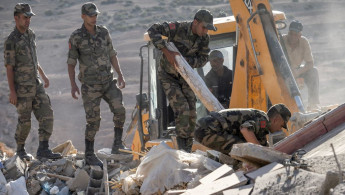Morocco mourns earthquake victims as death toll passes 2,000
Moroccans on Sunday mourned the victims of a devastating earthquake that killed more than 2,000 people, as rescue teams raced to find survivors trapped in the rubble of flattened villages.
The strongest-ever quake to hit the country has killed at least 2,012 people and injured over 2,059, many of them critically, according to the latest official figures.
Friday's 6.8-magnitude quake struck 72 kilometres (45 miles) southwest of the tourist hub of Marrakesh, wiping out entire villages in rural areas.
"I've lost everything", said Lahcen, a resident of the mountain village of Moulay Brahim, whose wife and four children were killed.
Rescue workers recovered the bodies of Lahcen's three daughters from the rubble of what was once their home, but have not yet found the bodies of his wife and son.
"I can't do anything about it now, I just want to get away from the world and mourn."
Troops and emergency services have scrambled to reach remote mountain villages where victims are still feared trapped.
Al-Haouz province, where the epicentre of the earthquake was located, suffered the most deaths with 1,293, followed by the province of Taroudant with 452.
First funerals
Bouchra, another resident of Moulay Brahim, dried her tears with her scarf as she watched men digging graves to bury the victims.
"My cousin's grandchildren are dead," she said in a knotted voice.
"I saw the devastation of the earthquake live, and I'm still shaking. It's like a ball of fire that has swallowed up everything in its path," she said.
"Everyone here has lost family, whether in our village or elsewhere in the region", she added.
Fatema Satir, a resident in Marrakesh, told AFP many were sleeping in the street for fear of their houses collapsing.
"Look where all these people are sleeping. There is no help for us, our houses have been cracked, others destroyed like my daughter's house, which was wiped out. We are in a chaotic state."
Authorities declared three days of national mourning, while several countries, including France, Israel, Italy, Spain and the United States, have offered aid.
Palestine's President Mahmoud Abbas told his premier to send teams to assist the victims, the Palestinian Authority's official Wafa news agency reported.
Algeria, which has had rocky relations with its neighbour Morocco, opened its airspace, which had been closed for two years, to flights carrying humanitarian aid and the injured.
'Years of aid'
The Red Cross warned that it could take years to repair the damage.
"It won't be a matter of a week or two… We are counting on a response that will take months, if not years," Hossam Elsharkawi, the organisation's Middle East and North Africa director, said in a statement.
I am deeply saddened by the loss of life and devastation caused by the earthquake in Morocco.
— President Biden (@POTUS) September 9, 2023
The United States stands by Morocco and my friend King Mohammed VI at this difficult moment. And, my Administration is ready to provide any necessary assistance for the Moroccan people.
The village of Tafeghaghte, 60 kilometres (37 miles) southwest of Marrakesh, was almost entirely destroyed by the quake, the epicentre of which was only about 50 kilometres (31 miles) away, an AFP team reported, with very few buildings still standing.
"Three of my grandchildren and their mother are dead," said 72-year-old Omar Benhanna. "They're still under the debris. It wasn't so long ago that we were playing together."
Residents buried around 70 victims in the nearby cemetery on Saturday, as the funeral rites were punctuated by cries and screams.
In the evening, television channels broadcast aerial images showing entire villages of clay houses in the Al-Haouz region completely destroyed.
"The public authorities are still mobilised to speed up rescue operations and evacuate the injured," the interior ministry said on Saturday evening.
The tremor was also felt in the coastal cities of Rabat, Casablanca, Agadir and Essaouira, where many panicked residents took to the streets in the middle of the night, fearing that their homes would collapse.
This earthquake is the deadliest in Morocco since the 1960 quake that destroyed Agadir, in which more than 12,000 people, about a third of the city's population at the time, died.




 Follow the Middle East's top stories in English at The New Arab on Google News
Follow the Middle East's top stories in English at The New Arab on Google News
![A group of Palestinians, foreign and Israeli activists gather to participated in an olive picking event on the land in the town of Battir, which is under threat of confiscation by Israel in Bethlehem, occupied West Bank on 8 November 2024. [Getty]](/sites/default/files/styles/image_330x185/public/2182930803.jpeg?h=199d8c1f&itok=__0LgGsa)

![People gathered around the rubble of destroyed houses to search for survivors [Getty]](/sites/default/files/styles/image_330x185/public/2024-11/GettyImages-2184733820.jpg?h=199d8c1f&itok=NiM1LO2f)